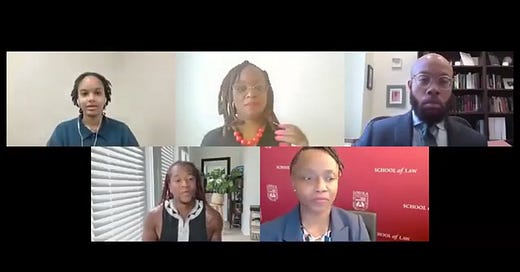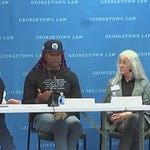Summary
Guests:
Jamilah Jefferson Jones, Earl B. Shurtz Research Professor of Law, Associate Dean for Diversity, Equity, Inclusion & Belonging, University of Kansas School of Law
Angela Rose Myers, Scholar-Organizer and Former President, Minneapolis NAACP
Frank Leon Roberts (Ph.D.), Assistant Professor of English & Black Studies, Amherst College
Michele Alexandre, Dean and Professor of Law, Loyola University Chicago School of Law
Etienne Toussaint, Assistant Professor of Law, University of South Carolina School of Law
Shirley E. Thompson (Ph.D.), Associate Professor & Associate Chair and African and African Diaspora Studies and Associate Professor of American Studies, The University of Texas at Austin
Anansi Wilson (JD/PhD), Associate Professor of Law & Founding Director, Center for the Study of Black Life and the Law
This conversation explores the concept of 'Furtive Blackness'—as articulated in Dr. Wilson’s innovative text Furtive Blackness: On Blackness & Being—and its implications for understanding the afterlives of slavery in contemporary society. The discussion delves into historical contexts, the cyclical nature of racial dynamics, the struggle for identity among Black individuals, and the persistent influence of legal structures that echo the logic of slavery. The panelists also examine the role of corporations in perpetuating racial inequalities, the political backlash against progress, and the importance of community activism in creating spaces of care and resistance. Ultimately, the conversation raises critical questions about citizenship, humanity, and the future of Black lives in America. In this conversation, Anansi Wilson and other speakers explore the intersections of technology, law, and the Black experience in America. They discuss how new technologies have enabled witnessing and communication, allowing marginalized voices to articulate their experiences and challenge systemic injustices. The conversation delves into the nature of law, questioning its role in society and its alignment with the lived experiences of Black individuals. The speakers emphasize the importance of spirituality, community resilience, and the need for reckoning with historical truths as they navigate the complexities of justice and existence in a society that often marginalizes them. In this conversation, Anansi Wilson and other panelists explore the intersections of law, community, and Black radical thought. They discuss the limitations of legal frameworks in achieving true liberation, the importance of grassroots organizing, and the role of joy and community in the struggle for justice. The panelists emphasize the need for deep intellectual engagement and the responsibility of emerging scholars to honor their ancestors while envisioning a more equitable future. They conclude with reflections on the ongoing quest for democracy and the importance of collective action.
Chapters
00:00 Introduction to Fertile Blackness and the Afterlives of Slavery
02:51 Historical Context: Dred Scott to George Floyd
05:47 Cycles of Black Existence: Space, Place, and Belonging
08:57 The Struggle for Identity: Blackness and Conformity
11:53 Legal Structures and the Persistence of Slavery's Logic
14:47 The Role of Corporations and Capital in Racial Dynamics
18:07 Political Afterlives: Backlash and Resistance
20:55 Fugitive Democracy: Activism and Community Care
23:50 The Question of Citizenship and Humanity
27:10 The Future of Black Lives: Law, Racism, and Resistance
39:40 Harnessing Technology for Witnessing and Change
44:00 The Nature of Law and Its Societal Role
47:47 The Crisis of Law and Black Existence
53:05 The Interplay of Technology and Law
57:49 Spirituality and Resilience in the Face of Oppression
01:03:03 Reckoning with Truth and the Future of Justice
01:18:48 The Role of Law in Liberation
01:22:08 Black Radical Intellectualism and Community Engagement
01:26:08 Joy, Community, and the Practice of Freedom
01:30:06 Teaching as Community Organizing
01:36:02 The Legacy of Ancestors and the Quest for Democracy
01:45:38 Imagining a New State and the Power of Collective Action
Key Notes
Fertile Blackness highlights the complex relationship between Black bodies and the law.
Historical cases like Dred Scott illustrate the ongoing struggle for Black rights.
The cyclical nature of racial dynamics suggests a recurring pattern of oppression.
Legal structures often perpetuate the logic of slavery in modern contexts.
Community activism plays a crucial role in redefining citizenship and humanity.
The concept of fugitive democracy emphasizes the need for spaces of care and resistance.
Corporations play a significant role in the accumulation of racial capital.
Political backlash often follows periods of progress for racial justice.
Understanding Black identity requires acknowledging the intersection of race, gender, and sexuality.
The future of Black lives hinges on confronting systemic racism and redefining legal frameworks. New technologies have transformed witnessing and communication.
The law often fails to reflect the lived experiences of marginalized communities.
Spirituality plays a crucial role in resilience against oppression.
There is a need to reckon with historical truths to move forward.
Black existence is often in a state of crisis due to systemic injustices.
The law can be a tool of oppression rather than liberation.
Community activism is vital in creating alternative forms of justice.
The narrative of Black life must not be solely defined by its struggles.
Art and culture are powerful forms of political critique and expression.
The future of justice requires a collective effort to redefine societal norms. The law is not a panacea for societal issues.
Black Radical Intellectualism emphasizes community engagement.
Joy must be rooted in authentic community connections.
Teaching should be viewed as a form of activism.
The legacy of ancestors informs our current struggles.
Democracy is an ongoing process, not a completed state.
Collective action is essential for meaningful change.
We must honor our ancestors in our work.
The importance of self-love in activism cannot be overstated.
We are leaving breadcrumbs for future generations.
Keywords
Fertile Blackness, Afterlives of Slavery, Black Lives Matter, Dred Scott, George Floyd, racial justice, systemic racism, legal structures, community activism, citizenship, technology, law, Black experience, capitalism, social justice, media, spirituality, community, activism, history, law, liberation, Black Radical Intellectualism, community engagement, joy, teaching, democracy, ancestors, collective action
Food, Queries & Quotes For The Soul
"The role of corporations in racial dynamics cannot be overlooked."
"Political backlash often follows periods of progress for racial justice."
"Fugitive democracy emphasizes the need for spaces of care and resistance."
"Understanding Black identity requires acknowledging intersectionality."
"Redefining identity is essential for the future of Black lives."
"The future of Black lives hinges on confronting systemic racism."
"capitalize on new technologies of kind of witnessing"
"the ways in which the video recording of Rodney King's beating"
"what capitalism, what democracy, what America looks like"
"the law true? And us speaking are true"
"the law is continuously used as a bludgeon"
"the law has been used to reorder when there is disorder"
"the law is designed to kill you because it protects those in power"
"the law is anti-Black"
"The law will not save us."
"We’re not going to legislate racism away."
"We have to deal with these deeper existential questions."
"Joy from capitalist exploitation is hollow."
"Teaching is a form of community organizing."
"Democracy is not yet here, but we can feel it."
"We are the new ancestors, act accordingly."
"What breadcrumbs are you leaving behind?"
"What does it mean to be a human being in this current moment?"
Titles
Fertile Blackness: A New Lens on Racial Justice
The Afterlives of Slavery: Historical and Contemporary Perspectives
Cycles of Oppression: Understanding Black Existence
Redefining Identity: The Struggle for Black Humanity
Legal Legacies: The Persistence of Slavery's Logic
Capitalism and Race: The Role of Corporations in Inequality
Political Backlash: The Aftermath of Progress
Fugitive Democracy: Activism in the Face of Oppression
Citizenship and Humanity: The Black Experience in America
Imagining the Future: Resistance and Resilience in Black Lives Matter
Witnessing Change: The Role of Technology





















Share this post